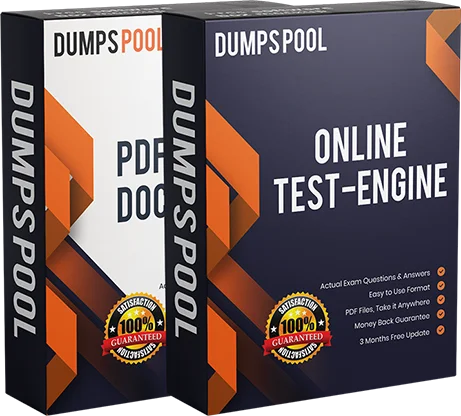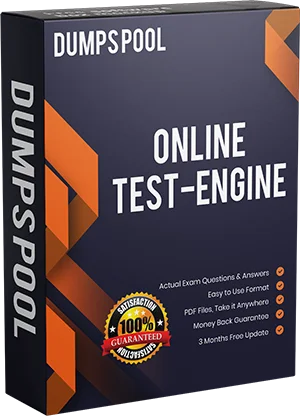PDF Only

$35.00 Free Updates Upto 90 Days
- KCNA Dumps PDF
- 126 Questions
- Updated On November 18, 2024
PDF + Test Engine

$60.00 Free Updates Upto 90 Days
- KCNA Question Answers
- 126 Questions
- Updated On November 18, 2024
Test Engine

$50.00 Free Updates Upto 90 Days
- KCNA Practice Questions
- 126 Questions
- Updated On November 18, 2024
How to pass Linux Foundation KCNA exam with the help of dumps?
DumpsPool provides you the finest quality resources you’ve been looking for to no avail. So, it's due time you stop stressing and get ready for the exam. Our Online Test Engine provides you with the guidance you need to pass the certification exam. We guarantee top-grade results because we know we’ve covered each topic in a precise and understandable manner. Our expert team prepared the latest Linux Foundation KCNA Dumps to satisfy your need for training. Plus, they are in two different formats: Dumps PDF and Online Test Engine.
How Do I Know Linux Foundation KCNA Dumps are Worth it?
Did we mention our latest KCNA Dumps PDF is also available as Online Test Engine? And that’s just the point where things start to take root. Of all the amazing features you are offered here at DumpsPool, the money-back guarantee has to be the best one. Now that you know you don’t have to worry about the payments. Let us explore all other reasons you would want to buy from us. Other than affordable Real Exam Dumps, you are offered three-month free updates.
You can easily scroll through our large catalog of certification exams. And, pick any exam to start your training. That’s right, DumpsPool isn’t limited to just Linux Foundation Exams. We trust our customers need the support of an authentic and reliable resource. So, we made sure there is never any outdated content in our study resources. Our expert team makes sure everything is up to the mark by keeping an eye on every single update. Our main concern and focus are that you understand the real exam format. So, you can pass the exam in an easier way!
IT Students Are Using our Kubernetes and Cloud Native Associate (KCNA) Dumps Worldwide!
It is a well-established fact that certification exams can’t be conquered without some help from experts. The point of using Kubernetes and Cloud Native Associate (KCNA) Practice Question Answers is exactly that. You are constantly surrounded by IT experts who’ve been through you are about to and know better. The 24/7 customer service of DumpsPool ensures you are in touch with these experts whenever needed. Our 100% success rate and validity around the world, make us the most trusted resource candidates use. The updated Dumps PDF helps you pass the exam on the first attempt. And, with the money-back guarantee, you feel safe buying from us. You can claim your return on not passing the exam.
How to Get KCNA Real Exam Dumps?
Getting access to the real exam dumps is as easy as pressing a button, literally! There are various resources available online, but the majority of them sell scams or copied content. So, if you are going to attempt the KCNA exam, you need to be sure you are buying the right kind of Dumps. All the Dumps PDF available on DumpsPool are as unique and the latest as they can be. Plus, our Practice Question Answers are tested and approved by professionals. Making it the top authentic resource available on the internet. Our expert has made sure the Online Test Engine is free from outdated & fake content, repeated questions, and false plus indefinite information, etc. We make every penny count, and you leave our platform fully satisfied!
Frequently Asked Questions
Question # 1
Open Container Initiative set container standards for
A. Code, Build, Distribute, Deploy containers
B. Run, build, and image
C. Code, Build, Distribute containers
D. Run, Build, Distribute containers
Question # 2
How does service logical group set of pods?
A. Using hostname
B. Using label and selectors
C. Using IP address
Question # 3
Have a pod 'hello' and a container in that pod 'green'. Which of the following commandswould get the logs for that container?
A.alias k='kubectl'k logs -p hello -c green
B.alias k='kubectl'k logs hello -c green
C.alias k='kubectl'k get logs -p hello -c green
D.alias k='kubectl'k logs -p hello green
Question # 4
Which part of a Kubernetes cluster is responsible for running container workloads?
A. Worker Node
B. kube-proxy
C. Control plane
D. etcd
Question # 5
Which style of operations are preferred for kubernetes and cloud-native applications?
A. Imperative
B. None of the above
C. Declarative
Question # 6
A ________ is a ready-to-run software package, containing everything needed to run anapplication.
A. Container Repository
B. Container Runtime
C. Docker
D. Container Image
Question # 7
To run a startup task before a Pod's container starts up. What Kubernetes feature can helpyou ac-complish this?
A. Init container
B. Sidecar container
C. Startup probe
D. DaemonSet
Question # 8
What cloud-native construct does a kubernetes pod wrap?
A. Container
B. Virtual Machine (VM)
C. side car process
D. Docker image
Question # 9
Which component of the kubernetes control-plane (master) are all requests to deploy andmanage objects posted to?
A. ETCD
B. Controller Manager
C. Kube-proxy
D. API Server
E. Kubelet
Question # 10
Which of the following factors does scheduling take into account when selecting a Node?
A. How many replicas there are in a Deployment
B. Services
C. Resource requirements
D. The number of existing Pods on a Node
Question # 11
What is the command to list all the available objects in your Kubernetes cluster?
A. kubectl get all
B. kubectl get api-resources
C. kubectl api-resources
D. kubectl get pods
Question # 12
What is the main difference between Argo vs. Flux CD?
A. Argo is pull-based, and Flux is push-based
B. No difference; both are pull-based
C. Argo is push-based, and Flux is pull-based
D. No difference; both are push-based
Question # 13
What Kubernetes resource would allow you to run one Pod on some of your Nodes?
A. DaemonSet
B. ClusterSet
C. Deployment
D. ReplicaSet
Question # 14
Which authentication method allows JWTs to authenticate?
A. OpenId connect
B. Client 'TLS' certificates
C. OPA gatekeeper
D. Anonymous
Question # 15
What do control groups provide when it come to containers
A. Permission
B. Image Storage
C. Isolation
D. Logging
Question # 16
Which tool is built on the GitOps toolkit?
A. Jenkins-X
B. GitHub Workflow & Actions
C. Flux
D. Jenkins
E. ArgoCD
F. Travis CI
Question # 17
What feature is used for selecting the container runtime configuration?
A. RuntimeClass
B. RuntimeContainer
C. Runtime
D. RuntimeConfig
Question # 18
What is Open Container Initiative 'OCI'?
A. A protocol for communicating with the kubernetes api
B. The governing body of the Cloud Native Computing Foundation 'CNCF'
C. An open standard for managing service mesh in kubernetes
D. An organization that creates open standards for containers
Question # 19
kubeadm is an administrative dashboard for kubernetes
A. False
B. True
Question # 20
What is the use of labels in Kubernetes?
A. All of the options
B. It is used to assign annotation to an object
C. It is used to assign key-value pair to an object
D. It is used to assign a name to an object.
Question # 21
What are default kubernetes namespaces?
A. default, kube-public, kube-system, kube-node-lease
B. kube-default, kube-public, kube-system, kube-node-lease
C. default, kube-public, kube-systems, kube-node-lease
D. default, kube-public, kube-system, kube-node-leases
Question # 22
How should folks new to the cloud native ecosystem, go about learning the differentaspects of the ecosystem?
A. by signing up the CNCF slack
B. by reading the Kubernetes documentation
C. by looking at the cloud native landscape
D. by looking at the cloud native trail-map
Question # 23
Stateful set requires which service for the network identity of pods?
A. Ingress
B. Load Balancer Service
C. Headless Service
Question # 24
Which of the following are not the metrics for Site Reliability Engineering?
A. Service Level Objectives 'SLO'
B. Service Level Agreements 'SLA'
C. Service Level Indicators 'SLI'
D. Service Level Definition 'SLD'
Question # 25
Which of the following provides cloud-native storage orchestration?
A. Cloud Provider Specific storage (EBS, EFS, Cloud Storage)
B. Cloud Storage
C. Storage IO
Leave a comment
Your email address will not be published. Required fields are marked *